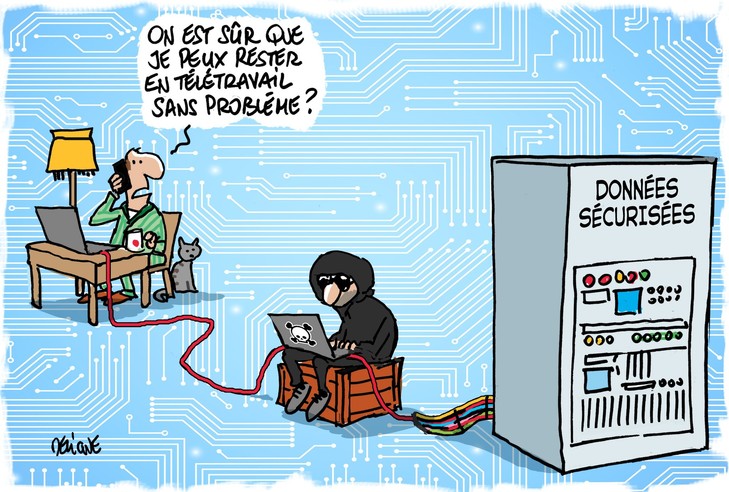
Multinationals adapt to combat cyber threats related to telecommuting
Telework is still going on.
As long as there is a state of emergency and the coronavirus pandemic, multinationals in different countries around the world are forced to find a way to adapt. The collaboration the distance has advantages, but one cannot also overlook the disadvantages. Especially cybersecurity. The idea is to realize how big a multinational company organize themselves.
This article will also interest you: Computer security and telecommuting: when employees become managers
"At Huawei, this switch wasn't really a big change because we used to do this kind of scenario. We work according to a multi-site scheme and our engineers intervene remotely. We have long developed our own tools to work remotely," notes Adnane Ben Halima, Vice President of Public Relations for Huawei North Africa's Mediterranean region.
It has been noted that companies can overcome the impact of the health crisis on their operations but also on their activities. They have several tools in place to collaborate fully and effectively even remotely. This has even made it possible to optimize performance in a certain way.
"The Group delivered computers or modems when necessary. In less than 48 hours and thanks to incredible mobilization, more than 12,500 fixed computers were transferred from the office to the homes of our colleagues. explains Baïdy Si, Head of It Security Services in French-speaking Africa for Atos. It also states that it took a week to switch 96% of their 10,500 employees to telecommuting.
This also applies to IT security processes. These issues were dealt with as a priority with the switch to telework. This has not been too complicated when you consider that large companies already have the means and policies to manage and protect data.
"Because our Group security policy is very mature, our IT systems and security processes were already in place when the pandemic occurred. The level of security was not affected and the employees were able to telework without a hitch," notes Emmanuel Cheriet, Maghreb and West Africa Director for Orange Cyberdefense.
The same was legally true for the Atos Group, which also has a personal data protection system. "All data is encrypted and protected by two-factor authentication, which limits access to a previously defined list of people. says Baïdy Si. It also lacks that internal communication is very important to establish a certain awareness of all staff about the necessary digital hygiene measures.

"All of our employees, without exception, receive mandatory training. They educate them about risks and educate them on good practices. ». To some extent this recall is very important. Indeed, there is always good to warn employees of the risks that are inherent in the use of digital services.
"Before we make interventions on customer networks, a set of rules must be followed to ensure the safety of operations. Every intervention can indeed produce a catastrophe," warned Adnane Ben Halima.
On the Orange side, the staff receives training and a cat of good practice. "Internally, we communicated the rules of "computer hygiene" to our teams. We have informed them about the major attacks in order to raise awareness of the increased risks posed by the situation throughout this period. explains Emmanuel Cheriet.
It should be noted that companies that had some shortcomings in computer equipment, be it software or physical hardware, in terms of their data protection policy, suffered serious consequences.
"For our clients in French-speaking Africa, the main challenge has been to secure the transition to telecommuting," said Baïdy Si. "It was also necessary to present to the clients the support protocol deployed by the group. 'First, we deployed a flash audit offer, so that our customers have 360-degree visibility on their level of exposure to cyber risks. Subsequently, we accompanied them in correcting the vulnerabilities detected, so that they gain confidence in these risks and to allow them to telework serenely. he adds.
"During this period, we have focused on helping our customers secure themselves. And to protect them at a time when their digital transformation was accelerating, with the implementation of solutions to secure remote work (example: VPN solution, Multi-factor authentication, etc.) notes Emmanuel Cheriet of Orange Cyberdefense.
Now access an unlimited number of passwords:
